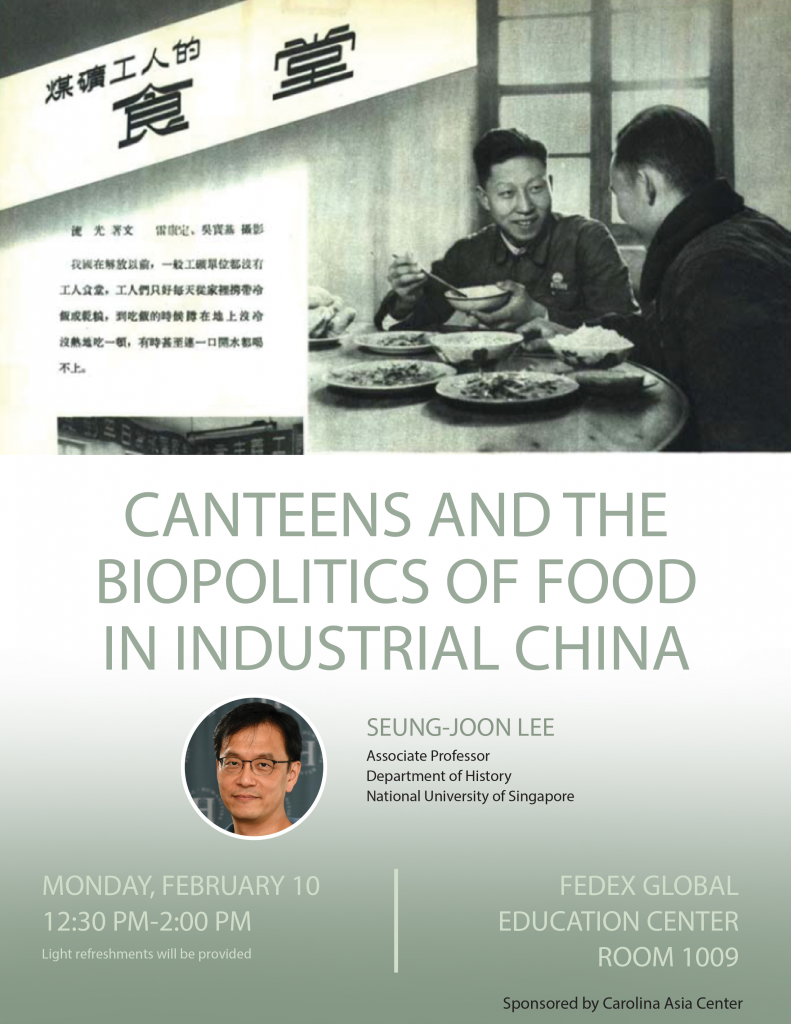
- This event has passed.
Canteens and the Biopolitics of Food in Industrial China
February 10, 2020 @ 12:30 pm - 2:00 pm
 In no country were hunger and malnutrition politicized more than they were in twentieth-century China. Mao Zedong triumphantly declared the founding of a new socialist regime on the 1st of October 1949. At the moment, however, China was facing an existential crisis: food shortages. The Communists had to face the same dilemma that had long haunted their political archenemy. Malnourished population, once a strategic target for political mobilization against their political opponent, could turn into a potential political threat to the new regime’s stability. Furthermore, food calories arguably remained as the prime source of energy in China’s national economy, predominantly agricultural. To build strong socialist economy – industrially mighty and yet egalitarian, the Chinese working population should eat better and more food than it ever had.
In no country were hunger and malnutrition politicized more than they were in twentieth-century China. Mao Zedong triumphantly declared the founding of a new socialist regime on the 1st of October 1949. At the moment, however, China was facing an existential crisis: food shortages. The Communists had to face the same dilemma that had long haunted their political archenemy. Malnourished population, once a strategic target for political mobilization against their political opponent, could turn into a potential political threat to the new regime’s stability. Furthermore, food calories arguably remained as the prime source of energy in China’s national economy, predominantly agricultural. To build strong socialist economy – industrially mighty and yet egalitarian, the Chinese working population should eat better and more food than it ever had.
Against this backdrop, the Communist authorities made unsparing efforts to promote nutrition science to optimize the working population’s food consumption. Rather than starting from ground zero, however, the Communists emulated the state-led nutrition movement that the previous regime once practiced. Industrial canteens, once a political battleground on which workers seeking their food entitlement and the KMT-style labor management frequently collided, transformed into a new space that embraced various forms of culinary innovations and nutritional experiments. It was truly a revolutionary advancement of labor welfare. Yet it was, this paper argues, rather managerial rather than political, which came at the expense of workers’ political autonomy.
Seung-joon Lee is a historian and associate professor in the Department of History at National University of Singapore. He is the author of Gourmets in the Land of Famine: The Culture and Politics of Rice in Modern Canton (2011) a number of research articles including, “The Patriot’s Scientific Diet: Nutrition Science and Dietary Reform Campaigns in China, 1910s-1950s, Modern Asian Studies (2015) and “Canteens and the Politics of Working-Class Diets in Industrial China,” Modern Asian Studies (2919). He is currently working on a book manuscript, “Revolutions at the Canteens,” exploring labor and management, the politics of the working-class diet, and food entitlement in twentieth-century China.
Related Events
The Carolina Asia Center supports diverse Asia-related events. However, CAC co-sponsorship of any talk, seminar, documentary screening, film screening, performance or celebration does not constitute endorsement of or agreement with the views presented therein. As an academic institution, we value diverse perspectives that promote dialogue and understanding.

